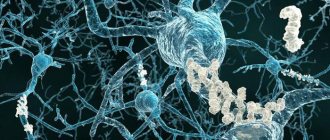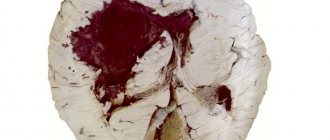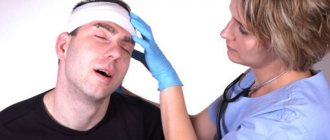Useful articles
Heroin withdrawal is an extremely serious condition, characterized by a long course and pronounced painful manifestations. How to relieve withdrawal symptoms is a question that concerns almost all patients trying to get rid of heroin addiction. What does it come from?
Withdrawal from heroin addiction is accompanied by a number of mental and somatic disorders that arise in the body in the absence of the next, now necessary, dose of the drug.
Important! Heroin withdrawal is rightly considered one of the most difficult and painful. As a rule, this condition requires professional medical care.
Manifestations of withdrawal are caused by the specific effect of the opiates that make up heroin on the patient’s nervous system. The fact is that these substances are very similar in essence to the natural hormones of happiness - endorphins. However, in addition to the feeling of joy and euphoria, for which, in fact, the drug is taken, opiates have an effect on specific receptors located in the intestines, brain and spinal cord. These substances eliminate pain, anxiety, tension, etc.
Gradually, the number of specific receptors decreases, and their degree of sensitivity also decreases significantly, and the processes of endorphin production are disrupted. Therefore, when the body of a person addicted to heroin does not receive a dose of the drug, his own pain receptors refuse to function on their own. As a result, approximately 10 hours after the last use of the drug, withdrawal begins, accompanied by severe pain, phobias, increased anxiety and many other clinical signs that are painful for a person.
Please note: The duration of withdrawal and the severity of its course largely depends on how long and in what quantities the person took heroin.
How long does this painful condition last? According to narcologists, a patient can suffer from heroin withdrawal for two or three weeks, and it is possible to completely get rid of its manifestations no earlier than after a few months! Characteristic signs Heroin withdrawal is characterized by the presence of four successive stages, each of which has its own specific signs and manifestations. The first stage of the pathological process is characterized by symptoms reminiscent of a flu-like state.
The patient exhibits the following symptoms:
- pupil dilation;
- rhinitis;
- lacrimation;
- chills;
- cough syndrome;
- frequent sneezing;
- sleep disorders;
- increased degree of anxiety and causeless irritability.
Please note: Already at the first stage of withdrawal, a person begins to have problems with appetite. In this state, the patient refuses food, the process of eating causes extremely unpleasant sensations in him, even convulsive syndrome is possible!
At the second stage of heroin withdrawal, the signs characteristic of the first phase become more pronounced.
In addition, the patient exhibits the following additional symptoms:
- excessive sweating;
- feverish condition;
- general weakness;
- severe muscle pain.
For the third stage of the pathological process, in addition to the signs listed above, the following symptoms are also characteristic:
- refusal of food;
- severe pain syndrome;
- lack of pupil reaction to light;
- prolonged bouts of sneezing;
- intense salivation;
- insomnia;
- increased internal tension and irritability;
- depressive state.
The fourth stage of heroin withdrawal is characterized by severe exhaustion of the patient’s body (during this period a person can lose more than 10 kilograms).
In addition, the following clinical signs appear:
- dryness and pallor of the skin;
- sunken eye sockets;
- sleep disorders (a painful desire to sleep and at the same time the inability to fall asleep);
- diarrhea;
- pain in the abdominal area;
- nausea and vomiting.
Note ! The first 2 weeks of heroin withdrawal are the most difficult, so it is extremely important at this stage to provide the patient with qualified assistance, preventing him from returning to the drug!
Treatment methods Treatment of heroin withdrawal is a complex process that few patients can cope with on their own. In most cases, hospitalization and professional assistance in a drug treatment clinic have a good effect.
Therapeutic measures are aimed at achieving the following results:
- Relieving withdrawal symptoms, alleviating characteristic symptoms.
- Cleansing the body of heroin residues and breakdown products of narcotic substances.
- Rehabilitation and restoration of normal functioning of the body.
As a rule, for these purposes, specialists use the method of rapid opium detoxification with the introduction of Naltrexone and Naloxone into the patient’s body. In addition, during the therapeutic course, patients are prescribed antidepressants, tranquilizers, and vitamin and mineral complexes necessary for full recovery.
Important! It is impossible to cure drug addiction by eliminating withdrawal symptoms alone; this is only the first stage on the path to recovery, after which specialists move on to getting rid of heroin addiction on a psychological level.
How to overcome withdrawal symptoms on your own? How to break and get rid of withdrawal symptoms at home? Is it possible to overcome this condition on your own? Unfortunately, it is extremely difficult to overcome withdrawal symptoms on your own; it requires enormous willpower. The main condition is the impossibility of obtaining a dose of the drug. For these purposes, some patients ask to be locked and even handcuff themselves. At the same time, the person experiences terrible mental and physical suffering.
Withdrawal after heroin is a severe condition that depletes and exhausts the entire body. Therefore, it is better not to attempt self-medication, but to turn to specialists who will help you overcome this difficult stage as quickly and painlessly as possible.
The text was checked by expert doctors:
Head of the socio-psychological service of the Alkoklinik MC, psychologist Yu.P. Baranova, L.A. Serova, a psychiatrist-narcologist.
CAN'T FIND THE ANSWER?
Consult a specialist
Or call: +7 (495) 744-85-28
Call! We work around the clock!
Heroin
Heroin is a synthetic opiate and is usually used by injection. Which immediately puts the addict at risk of contracting AIDS and hepatitis. After all, very quickly the addiction progresses so much that the patient ceases to worry about everything except the next dose, even his health and life. Therefore, injections are not always made with sterile needles, in other words, the syringe changes hands.
This white or tinted powder introduces the addict into euphoria and bliss, into a state of complete satisfaction, which is characteristic of the action of all opiates. But the price for this is expensive. After several days of use, when the drug is withdrawn, the addict experiences heroin withdrawal. And it lasts much longer than the effect of pleasure.
What does heroin use lead to?
The consequences of heroin use consist of physiological, psychological and social changes.
The cardiovascular system, kidneys and liver are destroyed due to the heavy load from the presence of a foreign substance in the body. There is a risk of contracting HIV and hepatitis, since drug addicts often share one syringe with several people.
The addict thinks only about how to get a dose, and is ready to go to great lengths to get it. Then, as a rule, problems with finances and the law begin to arise, and relationships with family also collapse. The person becomes very closed and does not want to make contact with friends from a “past life”.
Due to the fact that the drug addict has to constantly increase the dose, there is a high risk of overdose. If symptoms of “overdose” are detected, you need to provide the correct first aid:
- Call an ambulance
- Don't let yourself go into unconsciousness
- Revive with ammonia
- When vomiting, place the person on their side to prevent choking.
- Perform cardiac massage and pulmonary ventilation in the absence of respiratory activity
Drug withdrawal
Drug use sooner or later leads to the development of withdrawal syndrome. In case of drug addiction it is called drug withdrawal; in alcoholics it is called alcohol withdrawal syndrome. Drug withdrawal leads to the continuous use of stimulant drugs, because without them, the drug addict begins to experience a number of painful physical and mental symptoms. All these manifestations are called withdrawal syndrome, withdrawal symptoms.
Different psychoactive substances cause withdrawal symptoms at different times after the onset of the illness. There are drugs that are instantly addictive, and there are addictions that develop over several months. Heroin is one of those drugs that only need to be used 2-3 times to cause physical dependence. Withdrawal from heroin is a sign of its development.
How to recognize a heroin addict?
Symptoms that indicate a person is addicted to heroin include:
- desire to sleep during the day, constant drowsiness and lethargy;
- frequent mood swings - cheerful laughter gives way to aggression without any reason in just a few minutes;
- deterioration of appetite - many patients do not want to eat anything at all;
- narrowing the circle of interests, isolation, refusal to communicate with friends, relatives, colleagues;
- constricted pupils;
- “glassy” shiny eyes;
- lethargy.
Within a few weeks of starting to take the drug, a person is faced with:
- diseases of the kidneys, heart, liver, lungs;
- disruptions in the gastrointestinal tract (most patients have constipation);
- problems in the sexual sphere (in men, impotence occurs, in women, the menstrual cycle is disrupted).
Formation of physical affection
If a drug is used constantly, the human body gets used to it. Heroin is included in the metabolic processes of the body, in its metabolism. These are complex and subtle biochemical reactions in which the drug itself or its derivatives are embedded. As a result, it has a direct or indirect effect on every cell of the body. Naturally, the impact is negative, destroying cells and tissues.
On the one hand, this leads to a general slagging of the whole body; it is because of this that almost all drug addicts have concomitant chronic diseases that arose during the period of use. It also leads to physical dependence.
If a dependent person at this stage of the disease reduces the dosage of the drug or stops using it, then he experiences withdrawal symptoms. It is characteristic of the second stage of drug addiction and means that the patient has fully developed physical dependence. Now, in order to return to normal functioning, the body needs time; during this period, painful withdrawal symptoms appear. With heroin addiction, they are especially painful. However, under the supervision of a narcologist, it is possible to overcome heroin withdrawal with virtually no pain.
Psychological dependence
The disease drug addiction is complex; even the irresistible craving for a drug itself has two components: psychological and physical dependence.
As a rule, addiction is first formed in the psyche. It occurs for a reason; the patient has within himself a predisposition to develop the disease. Unfortunately, almost every person has mental characteristics that can lead to drug addiction.
If someone has problems with communication, with building harmonious happy relationships, achieving success and goals, we can say with confidence that behind this there are some complexes, fears, imposed beliefs and attitudes that prevent the person from being fully realized as a happy and successful person. In this case, the psyche is looking for a way to eliminate the problem, and usually there are two of them: solve the problem and forget about it.
Drugs allow you to do both. Of course, such a “solution” to a problem situation will be dubious, but at first, drugs, and heroin in particular, really help you loosen up, become more active, and even increase your status in some social groups. By clouding a person’s mind, they make it possible to completely erase problems from one’s head for a while.
So, after several uses, which at first bring euphoria and the illusion of resolving difficult situations, the human psyche becomes attached to the process of taking heroin and begins to identify it with something positive.
Socialization of a person after heroin withdrawal
After the improvement of physical condition, the stage of psychological rehabilitation and socialization begins after experiencing heroin withdrawal. This stage of recovery usually takes place in an inpatient rehabilitation center.
At a drug rehabilitation center, a person is helped by:
- understand the reasons for use,
- resolve intrapersonal problems,
- learn to cope with situations that lead to a breakdown,
- reconsider life values and goals,
- learn to build healthy relationships in the family and with others,
- if necessary, acquires professional and labor skills.
It is possible to undergo rehabilitation on an outpatient basis, but in 90% of cases this type of program does not allow the drug addict to achieve long-term remission. It’s hard for a person to be in an environment where everything reminds you of using. A drug addict regularly visits a narcologist, works with a psychologist and psychotherapist, and can attend group classes and auto-training that help reformat thinking and attitudes towards drugs.
Group classes are also organized for relatives of drug addicts. At such trainings, they teach the correct attitude to the problem of drug addiction of loved ones. Without moral support and care from relatives, it is difficult for a drug addict to overcome the craving for drugs and take the right path.
Heroin addiction
Heroin addiction is one of the most severe forms of drug addiction. Firstly, the addict develops a very strong psychological attachment to the incredible euphoria that he experienced during his first drug use. Although it is now impossible to achieve this effect, the desire remains. Total peace and relaxation, peace and contentment served as excellent bait for the patient’s psyche.
Heroin easily penetrates the brain, bypassing the blood-brain barrier, where it behaves similarly to morphine. Very quickly, the drug completely depletes the nervous system, leading to aging. Heroin overstimulates the brain's opioid receptors, which causes these effects. In all other systems of the body, it causes severe intoxication.
Drug concept
Heroin is a narcotic drug obtained from the pods of the opium poppy. Opium juice is purified from impurities, turning it into morphine; with further purification, heroin is obtained. Sometimes it is called “gerych”, “black tar” or “horse”. The substance is often mixed with other products: sugar, cornstarch, until it turns into a powder that can be smoked, inhaled, or dissolved in an aqueous base for injection. Injected heroin is one of the most dangerous drugs because it is highly addictive, and there is also a high risk of contracting HIV or hepatitis C due to neglect of the sterility of the syringe.
Reasons for use
When used recreationally, heroin produces intense feelings of euphoria, joy and relaxation. It evokes feelings such as:
- increased sense of well-being and confidence;
- lack of fear;
- seeming absence of problems;
- dulls nervous excitement.
Effect of heroin on the body
Constant intoxication and peculiarities of use during heroin addiction cause irreparable harm to the body:
- Infection with AIDS and hepatitis. Addicts completely neglect hygiene.
- Pathologies of the heart and blood vessels.
- Metabolic disorders.
- Liver pathologies.
- Mental disorders.
Most addicts die within a few years after the onset of the disease, most often death occurs from an overdose. Why do so few people strive to get rid of the disease if it brings such risks to life? The answer is simple - heroin withdrawal is one of the worst.
How to speed up drug elimination processes and support the body
How to get rid of withdrawal symptoms? There is a group of methods for these purposes. The first and main thing is detoxification. It is carried out in several ways.
The main one is medication. With its help, it is possible to cope with the pathological manifestation in a matter of days. Several types of drugs are used:
- Opioid receptor antagonists. Naloxone, Naltrexone.
- Solutions. Saline solution, magnesium sulfate. Glucose. Parenterally (intravenously).
- Diuretics.
Hepatoprotectors and drugs based on cardioprotectors are mandatory. To protect the liver and heart from harmful influences. Others as required.
The second method of detoxification is hardware. As a rule, it is auxiliary. Plasmapheresis, hemodialysis.
The third method is UBOD. Or ultra-rapid opioid detoxification. Allows you to achieve the effect within 6-8 hours. It takes place under general anesthesia.
How long does heroin withdrawal last?
Heroin, like any drug, causes physical dependence. But not every drug can compete with it in the duration and strength of painful symptoms during withdrawal.
Heroin withdrawal begins approximately 9 hours after the last dose of the drug. A person becomes worried because if he does not find a new dose, then something awaits him that psychologists recommend not asking former heroin addicts about.
Nervous tension increases, turns into aggression, fear and a feeling of danger arise, you want to run away, hide. On the second day, heroin withdrawal takes on new colors. The addict begins to experience its physical symptoms, this is somewhat reminiscent of a cold: runny nose, chills, sneezing. During withdrawal, sweating occurs, salivation increases, tears flow, and pupils dilate.
By the time withdrawal from heroin addiction lasts the third day, the patient loses his appetite, becomes nauseous, and suffers from serious gastrointestinal disorders. While withdrawal continues, an addict can lose more than ten kilograms in weight. The person is completely exhausted, convulsions begin.
By this time the patient no longer thinks about how long the withdrawal lasts; for him it merges into one painful infinity. There is a feeling as if muscles are torn, bones are broken, joints are twisted. The veins in the injection area are very itchy. At this stage, in order to get rid of pain, the patient may begin to bang his head against walls and furniture. His appearance is terrifying, his skin is earthy in color.
Symptoms usually worsen for 3-4 days, then begin to subside. If left untreated, withdrawal symptoms can last up to two weeks.
What is heroin and how is it distributed in Russia?
Heroin exists in natural and synthetic forms. The first type is a component of the opium poppy (a red flower that grows in dry climates). Synthetic heroin is the result of processing waste from drug production.
Heroin has been banned in Russia since 1924.
The spread of heroin in Russia began with the end of the Afghan campaign. And during perestroika, a massive takeover of the market began: future drug lords took advantage of holes in the legislation and smuggled drugs into the country.
All this has led to the fact that Russia is now in first place in terms of heroin use. Only 4% of the substance entering the country is intercepted by security forces.
How to cure drug addiction?
In a situation with heroin addiction, we are talking only about inpatient treatment. It must include all the mandatory stages of chemical dependence treatment:
- Complete detoxification.
- Long-term rehabilitation.
- Socialization.
Most likely, in the case of heroin addiction, professional motivation will be needed. During treatment, special attention is paid to restoring all body functions impaired by heroin use. A psychologist has a lot of work to do, because the mental attachment to heroin is very strong.
Treatment prices:
| Service | Price, rub) |
| Types of therapies | |
| Standard detoxification therapy | 3 500 ₽ |
| Double Detox Therapy | 6 000 ₽ |
| Enhanced Detoxification Therapy | 7 500 ₽ |
| Maximum detoxification therapy | 9 500 ₽ |
| Quick sobering up at home | 7 500 ₽ |
| Hospital at home 1 day | 22 000 ₽ |
| Advanced hospitalization | 15 000 ₽ |
| Treatment in hospital | |
| Accommodation | |
| Economy chamber (6 beds) | 2 000 ₽ |
| Standard room (4 beds) | 3 000 ₽ |
| Increased comfort (2 seater) | 5 500 ₽ |
| VIP chamber (1 person) | 12 500 ₽ |
| Individual post 24/7 | 5 000 ₽ |
| Medical and social rehabilitation 21 days | 140 000 ₽ |
| Service | Price, rub) |
| Initial consultation with a narcologist | for free |
| Consultation with a psychologist | 3 000 ₽ |
| Psychiatrist consultation | 5 000 ₽ |
| Coding at home Torpedo | 7 500 ₽ |
| Express output and encoding (doublet) | 13 500 ₽ |
| Coding using the Dovzhenko method | 12 000 ₽ |
| Hypnosis classic session | 13 000 ₽ |
| Ericksonian hypnosis session (NLP) | 8 000 ₽ |
| Coding method Torpedo | 5 500 ₽ |
| Double block | 8 000 ₽ |
| Esperal injection for 1 year | 9 900 ₽ |
| Tetlong for 3 months | 10 500 ₽ |
| Esperal gel for 1 year | 15 000 ₽ |
| Selincro course of therapy | 12 500 ₽ |
| Implantation of Disulfiram for 1 year | 18 000 ₽ |
| Vivitrol injection for 1 month | 26 000 ₽ |
| Naltrexone stitching for 3 months | 35 000 ₽ |
| Neuroimplantation Prodetoxon for 6 months | 47 500 ₽ |
| Narcopsychotherapy session | 50 000 ₽ |
| Neutralization of encoding | specify |
| Psychodiagnostics / pathological diagnostics | 7 500 ₽ |
| Psychotherapy session | 5 000 ₽ |
| Family psychotherapy | 6 000 ₽ |
| Outpatient rehabilitation in Moscow | 33 000 ₽ |
Expand
The danger of another breakdown remains for life. Therefore, it is important to constantly work with a psychologist. A specialist will help identify internal problems that often lead to drug addiction. In addition, it is necessary to work with the patient’s family - almost 80 percent of drug addicts’ loved ones behave completely incorrectly, aggravating the situation.
Leave a request for a free consultation with a specialist
We will contact you as soon as possible
- — Anonymous
- - For free
- — Around the clock
The advantage of treatment in the clinic is that each patient has the opportunity to be accompanied by a doctor after completing the course. This means that a person can call the doctor at any time and find out how to overcome insomnia, drug cravings, nervousness, fear, etc. Family support and a good specialist make up 50 percent of the success of treatment. The remaining 50 is the desire of the addict himself to get rid of the addiction.
Article prepared by an expert
Terekhova Anna Vladimirovna
psychologist-consultant on socio-psychological work with addicted clients and their families. More than 9 years of experience.
Similar articles:
How to determine the presence of drugs in the blood
What to do if an addict does not want treatment?
The effect of opium on the body
Alprazolam (Xanax) is the most popular drug among young people
What is detoxification and why is it important in treating chemical dependency?
2 comments on “Heroin Withdrawal”
- Vania:
December 9, 2021 at 02:41 pm
Withdrawal from heroin begins on the third day after the last dose. The condition can last from 5 to 15 days, but it all depends on individual indicators. For some drug addicts, the symptoms subside on the 5th day, and by the eighth day they feel completely healthy. It is necessary to understand how it works and what exactly changes in the body. This drug is based on an opiate, or more precisely, opium alkaloids. The drug belongs to this group
Answer
- Veronica:
December 15, 2021 at 16:05
If the addiction began much earlier, it is better to contact a professional narcologist. Many private doctors practice relieving symptoms and withdrawal symptoms at home. In addition, clinics also offer such services. For example, our Nika-Israel clinic relieves symptoms. Doctors use only the most modern, innovative drugs approved by international medical organizations. Thus, yesterday's drug addict completely gets rid of the consequences of drugs and can safely start life from scratch.
Answer
Treatment of heroin addiction in
The process of treating heroin addiction is extremely difficult, because specialists must relieve acute conditions, withdrawal symptoms, eliminate physical attachment, and the psychological causes of the disease. In addition, it is not enough to simply cure a heroin addict and return him to a normal lifestyle. After all, his condition is still unstable; a person needs some time to adapt to a new life. During this period, he also needs the help of doctors.
Today you can see a lot of offers for the treatment of drug addiction diseases, not all of them include a full range of services or provide the opportunity to conduct a full course of treatment and rehabilitation for addiction. There are clinics and centers that specialize only in emergency care, or, on the contrary, in rehabilitation after drug treatment.
Ours provides its clients with support and quality treatment at absolutely all stages of the treatment course. If a loved one develops a heroin addiction, you can call a narcologist to your home to relieve withdrawal symptoms, use the service of motivation for treatment, or hospitalize the patient. We provide complete detoxification and drug treatment for addiction, as well as long-term psychological rehabilitation. Post-treatment support by our specialists helps the recovering person calmly settle into a new sober life without the risk of breakdowns, which is extremely important for heroin addiction.
However, it is not enough just to know about such opportunities. After all, while you are thinking and planning without doing anything, the patient risks his life every day, and his body receives irreversible damage that can make him disabled, even if the addiction is cured. And no one has canceled overdoses, especially among heroin addicts.
Therefore, we sincerely recommend that you do not hesitate, but ask all your questions regarding treatment today, draw up a rough plan, and find out the estimated cost. It's free and doesn't obligate you to anything. You can do all this at any time by calling our hotline, its number is listed on the website page. You can also fill out any feedback form and receive a call back from our consultant.
How and with what to remove
You can try to relieve a heroin addict from addiction at home if the experience is short and the withdrawal syndrome is not accompanied by life-threatening attacks. When the withdrawal symptoms are too severe, the condition can only be alleviated with the help of antidotes, detoxification, and drug treatment in a hospital inpatient setting.
It is important to understand that self-treatment for heroin addiction will never be as effective as therapy in a drug treatment clinic. Conversations with relatives are no substitute for sessions with a qualified psychotherapist, and medications from a home medicine cabinet are not comparable to serious medications that only doctors prescribe.
At home
It will not be possible to relieve withdrawal symptoms on your own without medication - you can only wait it out at home, limiting the addict from any opportunity to get and take heroin. But not everyone is able to keep a person locked up for more than 2 months, and watching him suffer during abstinence is too difficult (sometimes even the relatives themselves cannot stand it and give drugs just to relieve the symptoms).
At home, you can try to help the addict a little with medications and herbal remedies. You can make it easier to survive heroin withdrawal syndrome:
- Daily intake of Karsil and Succinic acid - the drugs activate the liver and help quickly get rid of heroin residues.
- A large amount of water (even if this makes the drug addict vomit).
- Absorbing drugs like Activated Charcoal (they will not help you recover from withdrawal immediately, but will only improve the condition slightly).
- Green tea, infusion with chamomile, St. John's wort - these folk remedies slightly calm the nervous system, relieve increased anxiety, and cope with insomnia.
- Medicines like Loperamide that relieve gastrointestinal disorders.
Important: before giving a drug addict any drug for withdrawal, you must read the description of side effects and contraindications. There are medications that cannot be combined with opioids (heroin is one of them) and can cause serious consequences.
You should not try to suppress withdrawal symptoms on your own with the help of other stimulants, tranquilizers, sleeping pills, or alcohol. They do not cause withdrawal symptoms, but only develop polydrug addiction (addiction to several substances at once).
Treatment in the clinic
Inpatient drug treatment centers help relieve heroin withdrawal and provide rehabilitation. The price of such a service is from 120,000 rubles. But you shouldn’t skimp on such an issue as eliminating withdrawal symptoms, since the success of the entire treatment depends on this.
Heroin withdrawal in the clinic is stopped through UBOD - rapid detoxification, carried out under anesthesia and involving the administration of Naltrexone (a specific antagonist of opioid drugs). If the experience is long and the withdrawal symptoms are severe, then under the supervision of doctors the patient is given Suboxone or Subutex. They have similar effects to heroin, but are less dangerous to health. The dosage of this medication is reduced daily, which allows the body to gently begin to function at full capacity again. To relieve withdrawal symptoms, doctors give heroin addicts:
- analgesics, NSAIDs (Ibuprofen, Naproxen);
- antihistamines (Tavegil, Diphenhydramine);
- drugs to normalize intestinal function (Loperamide);
- antihypertensive drugs (clonidine);
- medications for mental disorders (Valium).
After stopping the physical signs of withdrawal, measures are taken to prevent relapses - it is necessary to eliminate the psychological symptoms of withdrawal syndrome. To do this, psychotherapists conduct sessions with the drug addict - they help restore faith in themselves, teach them to enjoy life without heroin.
Consequences and prognosis: is it possible to die?
You shouldn’t trust advice like: “When quitting heroin, you don’t need to do anything, you should just wait out the withdrawal.” This is a mistake, because without help, a drug addict risks dying during the abstinence period. Death most often occurs due to pathologies of the cardiovascular system (high blood pressure, which threatens stroke or heart attack).
The mental state of a heroin addict is also dangerous. During the withdrawal period, he is susceptible to severe depression - according to statistics, 80% of heroin users experiencing withdrawal think about suicide.
Withdrawal is not the only thing that threatens the life of a drug addict in the beginning. Long-term use of heroin often makes a person disabled - pathologies of the heart, liver, kidneys, and mental disorders occur. This can only be prevented by timely treatment. At the first sign of psychotropic substance use, relatives should try to convince the drug addict to overcome the deadly habit. You should not lecture, threaten, scold, you need to show maximum patience and care. If this does not help, then you should seek help from a narcologist.











